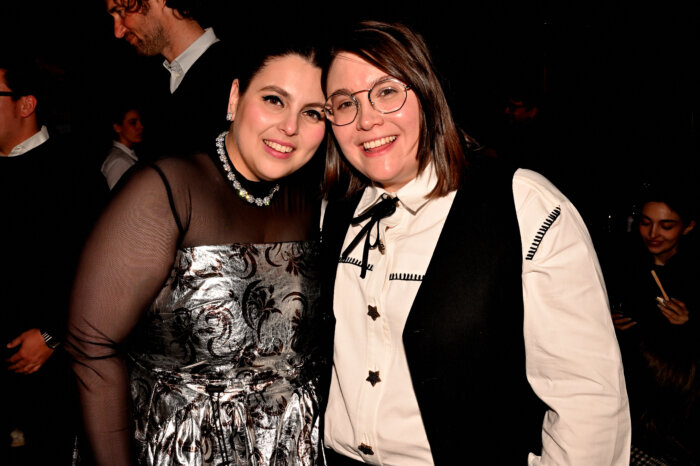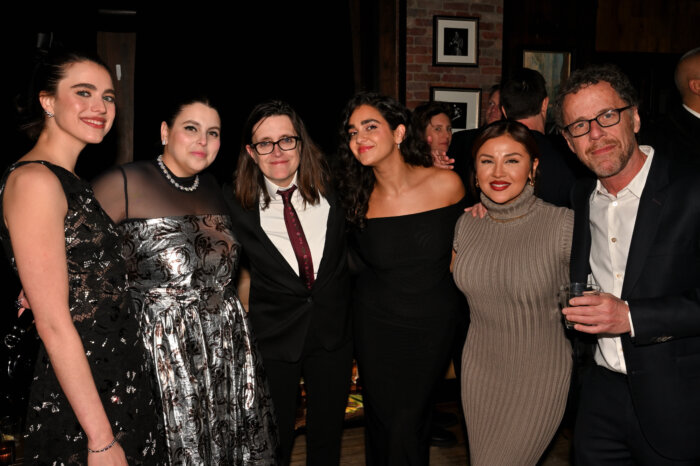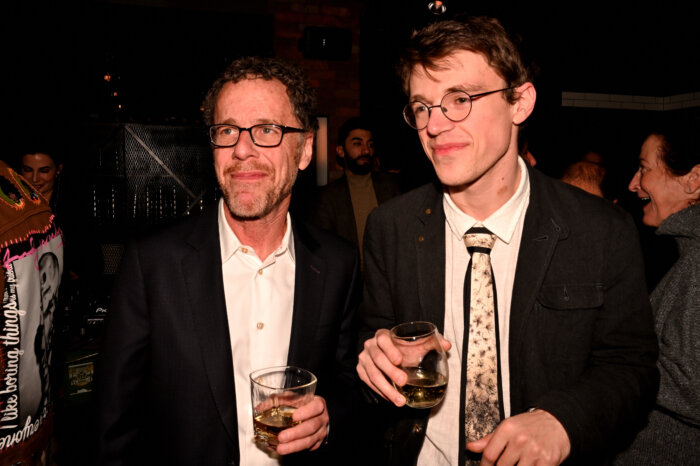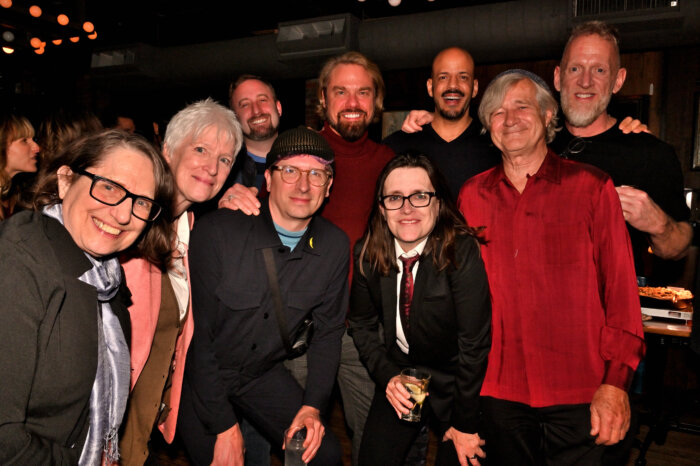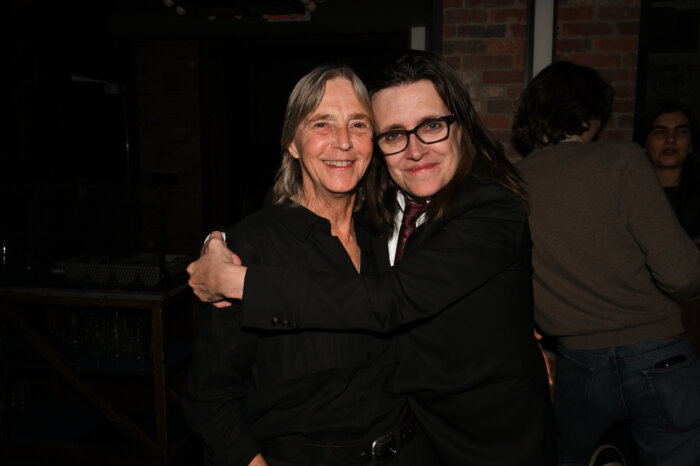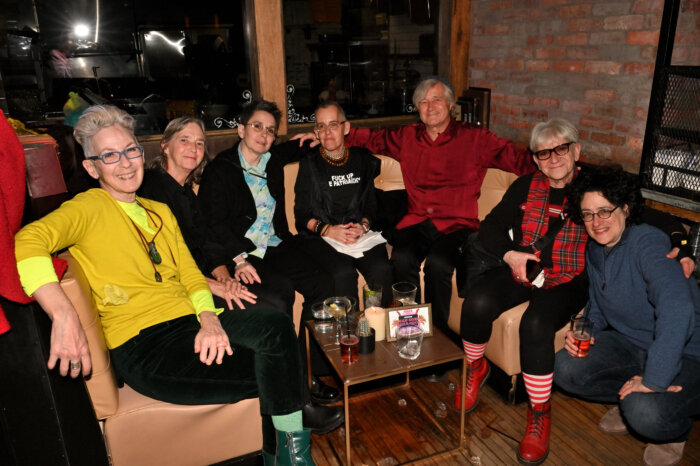Ethan Coen and Tricia Cooke’s “Drive-Away Dolls” brings together a classic odd couple: Jamie (Margaret Qualley) spends her evenings picking up women in bars, while Marian (Geraldine Viswanathan) prefers to stay inside reading Henry James novels.
Following Marian’s breakup with Suki (Beanie Feldstein), they go on a road trip from Pennsylvania to Tallahassee, Florida. But without their realization, the content of their car’s trunk is dangerous, setting several buffoonish male gangsters on their path.
Colorful, kaleidoscopic ‘60s flashbacks, depicting the adventures of groupie Tina Plaster Caster (Miley Cyrus) lead into a subplot involving right-wing Senator Channel (Matt Damon), whose billboards posing with his family line Florida’s highways. “Drive-Away Dolls” finds space for queer women falling in love by living out their adventurous impulses. Proudly raunchy, with sex toys and female orgasms galore, the mood remains light and buoyant, with touches of ‘60s exploitation movies and ‘90s neo-noir. While Coen is well known for his many films directed with his brother Joel, “Drive-Away Dolls” reflects the gaze of co-director/writer/editor Cooke, who is lesbian. Gay City News spoke with both in mid-February. Focus Features opens “Drive-Away Dolls” on Feb. 23.
Since the film is set in 1999, did you find it difficult to recreate such a recent period?
Tricia Cooke: We worked with good people: costume designer Rachel Stivers and set designer Kate Bechak. We wrote the movie in 1999, so back then it was contemporary, but we couldn’t get it made. I just gave them a lot of reference photos of the Caddyshack, the Cubby Hole, Henrietta’s, and bars I used to hang out in back then. They did their own research.
Ethan Coen: For a period piece, people think of Westerns. Capturing a recent period is odd, but it helps remove the story from reality. It puts it in its own world.
Was the idea of the road trip based on anything you’ve done personally?
Cooke: I had taken a drive-away car across the country when I was in college, so I was familiar with that process. Ethan and I often take road trips. We had driven through down to Tallahassee. I’ve taken road trips with past girlfriends and gone to gay bars around the country.
Although this is just an undercurrent, the film feels like a celebration of the lesbian bar, especially as they’ve declined over the last 20 years.
Cooke: Sure. I celebrate all gay bars that I can find. To me, it’s a little easier to find gay bars in New York City, where we both live. You go not only to meet new people but have a sense of camaraderie and community. Sadly, because so many are closing, we’re losing that. I remember in the ‘90s, going to Meow Mix with everyone bringing lawn chairs to watch “The L-Word” together.
Florida has become a symbol of queerphobia, but even in the ‘70s, Anita Bryant came from there. It’s hard to see the billboard with Matt Damon’s character and not think about Ron DeSantis. Were you thinking about that when the idea originated in the ‘90s?
Cooke: Florida was certainly a purple state, if not a red one. I try not to think about Anita Bryant, except when she got the pie in her face. During the shoot, DeSantis came up a lot. We looked at images of politicians like him and Marco Rubio and modeled Matt Damon’s character on them. At one point, we had a title card that read “Say Gay” at the end of the movie. It’s a middle finger in the air to conservative politicians in Florida.
The film comes out during a period when American cinema seems really asexual, especially compared to the ‘90s. A few films have challenged that, but they sometimes get a hostile reception on social media. How do you think people will react to such a horny, for lack of a better word, movie?
Coen: You’d think people would go “Thank God, a horny movie!” Where are the horny movies? Mainstream cinema is nothing but fantasy, sci-fi and superheroes. It’s another way of saying “Where are the human beings?”
Cooke: I’m sure it’ll be polarizing, and not just between liberals and conservatives. There will be queer people that won’t like the movie and queer people who will embrace the movie for how promiscuous it is. For us, we wanted to make a more subversive, transgressive movie. In the early 2000s, it felt more transgressive. To me, it doesn’t now, but Moms For Liberty sure isn’t gonna like it. It was important to have sex in the movie, but keep it tasteful.
There are more sounds of sex than images of naked women.
Coen: The problem with covering a sex scene is that you don’t always want to see actors’ body parts. However sophisticated the audience is, that’s what they’ll focus on, not the actor’s face. Weirdly, it becomes about anatomy, not sex. It’s a natural thing to fixate on private parts if they’re shown.
This is the second film Ethan has made without Joel, following a documentary on Jerry Lee Lewis. Do you plan to get back together in the future?
Coen: Yeah, we already wrote something last summer that we plan to make eventually. Me and Tricia are also about to start shooting another movie.
Did you consider crediting both of yourselves as directors?
Coen: To be fair to myself, yes, but Tricia had the attitude “Why bother?” We are both directors on the movie, but Tricia is not a member of the Director’s Guild of America and I am. I don’t know what the process is now, but it was very laborious getting both Joel and myself credited as co-directors way back when. The fact that is we did co-direct the movie.
Cooke: I already had way more credits than I needed. The main reason we thought about it was that we wanted to make sure people knew a lesbian was involved creatively. It would be weird if it were presented as a straight man making a queer movie. We shared all the responsibilities.
There’s a big demand for authenticity behind queer narratives, like the idea that you should only cast openly LGBTQ actors in those roles. You’ve talked about the fact that you have an open marriage and you both have other lovers. Did you feel pressured to talk about your personal lives for the film?
Coen: Not really, because we’re not performers. Nobody cares, basically. There are queer actors (Feldstein, Cyrus, Colman Domingo) in the movie. Their orientation doesn’t always line up with their characters.
Cooke: We were forthcoming at the start of the filmmaking process. We knew it would be important to talk about and we were fine with it if people did care. But it didn’t feel like pressure. I just hope that everyone is queer one day.
Coen: We didn’t ask Matt if he was really a Republican, but I suspect he’s not.
You also cast some name actors in small roles. Were they game about playing a supporting role, with Pedro Pascal’s character getting killed in the first five minutes?
Coen: They’re good actors. It’s not about ego competition. Their egos have been sufficiently fed for several lifetimes, so they were looking for a role they’d enjoy doing.
Cooke: We didn’t know much about Miley Cyrus when we called her. I love her music, and I think she’s very funny as a performer and an actress. I knew she had a charity that worked with unhoused LGBT youth. I thought she might be interested in this very small part. When she came on set, we didn’t know she’s fascinated with phalluses and has a room in her house filled with penises. She knew who Cynthia Plaster Caster was, whom her character was based on. I think for people who have smaller roles, they think they’ll have fun with it.
How did you create the psychedelic imagery of the ‘60s flashbacks? Animation? CGI?
Coen: It’s a company in London called Voodoo Dog. Going in, we had no idea what they would be. We were more concerned with directing dramatic scenes, but the weirder, more abstract thing was harder to figure out, so we dumped it on them. They were great. They totally understood the ‘60s look and attitude and created it with footage of Miley.
Cooke: Ari Wegner, who shot the movie, compiled reference footage, like Stan Brakhage films and light shows. We’re too square to come up with all that stuff on our own these days. I used other B-movies as references for the overall look. You can get lost in them and wind up not making a movie at all!
Every movie Ethan has made has been done with a co-director. How do you think that’s affected the way you work, compared to most directors?
Coen: Never having worked alone, I have nothing to compare it to. Filmmaking is such a collaborative process that you could say the D.P. is also a co-director. She was crucial to figuring out what we were doing. The more you do it, the more you feel like you’re just the frontman for a group of people. It’s not an exalted, isolated function.
One thing I found striking about the film is that all the violence consists of men killing each other. Even half an hour in, I felt that the women were going to be safe, and it would be a fun story for women to watch. That seems like a very deliberate choice.
Cooke: The portrayal of men as bumbling oafs was deliberate. It was a way of establishing strength and power in the movie, by having women be in control. At least Suki is, and then the other two women, who are in the dark for a while, figure it out.
Coen: When you’re talking about a victimized group of the population, violence against women just isn’t so funny.
Below are pictures from a New York City after-party to coincide with the release of “Drive-Away Dolls”
